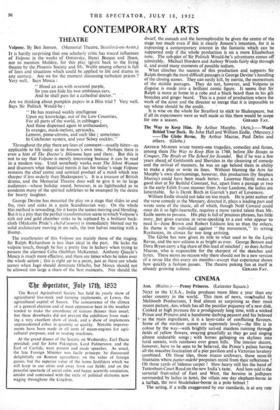Airrxua MURPHY wrote twenty-one tragedies, comedies and farces, among them
The Way to Keep Him in 1760, before She Stoops to Conquer, The Rivals or The School for Scandal. But if he was a few years ahead of Goldsmith and Sheridan in the cleansing of comedy and the revival of manners, he was an age behind them in ability to make a play or write its lines. Without blaming the Arts for Murphy's own shortcomings, however, this production (by Stephen Murray) could have been much better: Laurence Hardy makes a good shot at Sir Bashful Constant, but, apart from a passage or two in the early Edith Evans manner from Avice Landone, the ladies are lamentable. So is Derek Birch in Garrick's part of Lovemore.'
William Eedle should not take on too much. He is joint author of the verse comedy at the Mercury, directed it, plays a leading part and wrote some of the music, all of which, though Noel Coward could once do it so light-heartedly, requires a more varied talent than Mr. Eedle seems to possess. His play is full of precious phrases, has little story,_but gives exercise in verse-speaking to a cast who appear to need it—June Brown and Robert Eddison less so than the others. Its theme is the individual against "the movement," its setting Ruritanian, its climax far too long arriving.
The Globe has now given its title to what used to be the Lyric Revue, and the new edition is as bright as ever. George Benson and Dora Bryan carry a big share of this load of mischief ; so does Arthur Macrae, who is responsible for the sharpest of the sketches and lyrics. There seems no reason why there should not be a new version of a revue like this every six months—except that experience shows how quickly a fashion passes. The theatre poking fun at itself is


































 Previous page
Previous page